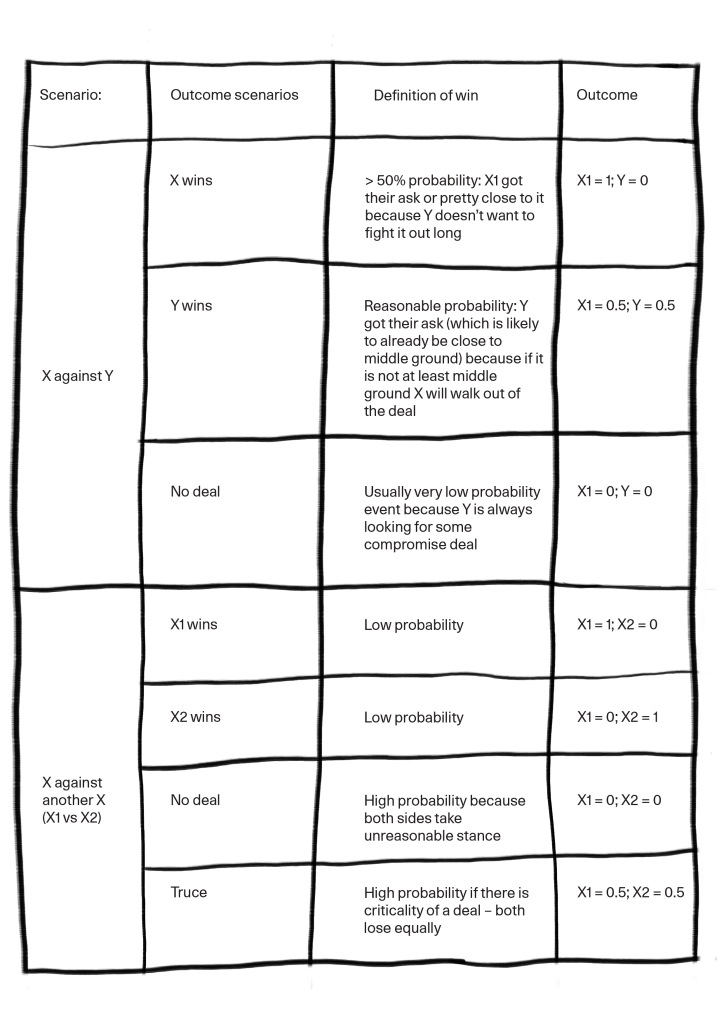Nice Folks Don’t Finish Last; They Finish with Lasting Relationships
ByGV Ravishankar
PublishedSeptember 28, 2022
Understanding where you, and the people around you, sit on the ‘reasonable/unreasonable’ matrix can help you navigate almost any situation with more clarity.
On a hot Hyderabad summer day in 2012 a friend of mine, who works at a growth fund, was sitting in the lobby of a legal firm sipping on some cool Rooibos tea. Her brief moment of pleasure was interrupted when the legal counsel hired by a founder walked into the room and declared: “I am not going to let Mr. Narayana sign this document – ever!”
My friend, who sat on the startup’s board, politely pointed out to him that this was all as per the term sheet from the new follow-on investor. “That doesn’t matter”, retorted the lawyer. She called the incoming investor and tried to move the ball forward there. “Hey, we have a small request – can you drop this one term from the agreement. As you know it has minimal impact but the company lawyer strongly recommends against accepting it”. The investor on the other side said, “If even a comma or full stop changes from the termsheet we will walk away!”. There it is – yet another draining “sandwich” conversation, where my friend found herself between two people with strong views. She called me and said “Sometimes I feel like I am the only one trying to find common ground to make things work. Is there any upside to being reasonable?”.
There are two types of people in this world as I have come to understand through my professional and personal life experiences. There are reasonable people – people who try to find balance, find some way to make things work, have high empathy and are keen to find a win-win answer where possible. Then there are unreasonable people – people who usually take a very firm stance and can’t see another point of view, and who want what they want and no less. We all know such people in our lives. Take a minute to think about where you belong. Don’t tell me yet; let me guess! You are a reasonable person. Did I guess right? That’s the issue!
OK, maybe I tricked you a little! Actually, there are four types of people – reasonable people who know they are reasonable, reasonable people who don’t know they are reasonable (but that’s harmless), unreasonable people who know they are unreasonable (beware!), and unreasonable people who think they are reasonable (need help!). I had a 75% chance of getting my answer right.
But why am I trying to bucket people like this? If you are a reasonable person, you are at wits’ end when you find yourself, time and again, in the middle of what looks like an unfair negotiation and many times brokering between two unreasonable people! It’s important to understand why people are unreasonable and what to expect when you find yourself in such a circumstance, so you can navigate situations better and learn what type of people to pick to work with in the future.

Why are unreasonable people unreasonable?
I have often wondered why people behave unreasonably. And the harsh reality is they do so because it works for them! As crazy as it may sound, unreasonable people are unreasonable because they can be, and it has worked for them so far. Over time this behavior is reinforced due to the success they have. But why are they able to get away? Let’s understand this through some simple math.
Suppose person X is unreasonable and person Y is reasonable. When person X and Y are negotiating, X almost always takes a tough stance and Y is usually trying to get their point across to say why their ask is fair versus the stance X has taken. Usually there are three likely outcomes. Let’s look at this carefully.

So now let’s look at X’s outcomes and if, for a minute, you forget the probabilities and just do the average outcome scores for X what we get is (1+ 0.5+0+0+1+0+0.5)/7 = 3/7 = 0.43 or a 43% chance of success. If you adjust this for probabilities and say we define high probability as 2 times more likely than low probability the weighted average outcome = (2+0.5+0+1+0+0+1)/7 = 4.5/7 = 64%. So X1 has a 64% chance of getting an even deal or a better than even deal when they are negotiating in any situation. Compare this to Y’s outcome. Y’s best case in most cases is 0.5 and high probability case is 0. Again, forgetting probabilities, Y’s outcome is (0+0.5+0)/3 = 0.5/3 = 0.17, or 17% chance.
This explains why unreasonable people are unreasonable. They have a high chance of getting away with it. And this also explains why reasonable people are reasonable – because they want an outcome and most often the best deal they can get is a mid-way answer which works for them – some pain, some gain! When these two personas collide, the unreasonable people always seem to do better. And when two unreasonable people meet, there is either no deal or a split deal – and if you unpack all the split deals, you’ll typically find there was a reasonable person in between doing the negotiations!
“…this also explains why reasonable people are reasonable – because they want an outcome and most often the best deal they can get is a mid-way answer which works for them”
What next?
If a reasonable person is reading this, there are two questions that likely come up: (a) How do I deal with unreasonable people? and (b) Am I a loser being a reasonable person? Do nice folks indeed finish last?
Over time I have come to the realization that there are two ways to deal with unreasonable people.
a) If the unreasonable person is unreasonable and they know it because they know it’s worked for them and they are brazen about it, then better to not deal with that person – life is too short and this behavior of theirs will hurt you in the future. So best to avoid them!
b) If the unreasonable person is unreasonable and doesn’t know it, it’s worth helping them see it and if they change that then maybe you can still make things work! But most often people are not easy to change!
So, if you are a reasonable person, are you a loser with a low win rate? I have thought a lot about this question and have come to the conclusion that winning in every negotiation is not a victory we will cherish in the long-term because doing so will create long-term loss of relationships. Reasonable people will want to work with other reasonable people and avoid unreasonable people in the long-term or stop giving into them (usually most people go into a tit-for-tat strategy where they mimic what the other party did the last time). And this is the big win that reasonable people get – the active self-selection by other reasonable people to work with them, while unreasonable people deal with the long-term repercussions of their short-term desire to win each negotiation – that they will have no reasonable person wanting to work with them in the long term.
If a person reading this concludes they’re an unreasonable person, they’ll probably ask – am I a villain? Honest answer is no! On many occasions, unreasonable people help find better solutions due to the constraints they put on the table. It helps to have those constraints to drive innovation! In fact, much of the world’s progress could be ascribed to unreasonable people. To quote George Bernard Shaw, “The reasonable [wo]man adapts himself to the world; the unreasonable one persists in trying to adapt the world to himself. Therefore, all progress depends on the unreasonable [wo]man”. But if you are an unreasonable person who wants to win in the long-term, I have some advice for you to consider – be as smart as possible but not smarter!
“The reasonable [wo]man adapts himself to the world; the unreasonable one persists in trying to adapt the world to himself. Therefore, all progress depends on the unreasonable [wo]man”.
George Bernard Shaw
Recommended Reads
Here are three articles I read over the last few weeks that I found interesting:
My friend Sanjeev, who visited me recently, sent this post as a followup to our conversation. “The Tail End” illustrates how time is limited and our lives are short and the importance of spending time with our family – particularly parents. While I have read this before, this came as a timely reminder to me and this may be one of the articles one reads every year to help us make better choices in life!
“The Elephant in the Room: The Myth of Exponential Hypergrowth” is a longish read which provides a framework to better understand high growth companies, suggests an alternate model for how fast-growing companies actually grow and challenges us to rethink how and why we use terms like ‘hypergrowth’.
No social interaction these days is complete without a mandatory conversation on global inflation. But the harsh truth is that nobody really knows how things will really pan out. In this Bloomberg op-ed, titled “Nobody Knows How Long Inflation Will Last. That’s Life”, Niall Ferguson explains why these things are so hard to predict and introduces readers to complexity theory, drawing on examples from history and science to show why economic forecasting has become incredibly challenging.
If you have time for a longer read, here are two books I’d like to recommend.

The Botany of Desire: A Plant’s-Eye View of the World, by Michael Pollan
This is one of the most interesting reads of the year – and the best part is this probably has no relation to the work you do, nor is it likely to give you deep life insights. Despite that, it’s an incredibly compelling read that tells the story of how four different plants have ruled the world and made themselves so endearing to humans that we continue to propagate them and, in a way, are servicing their needs to thrive as a species!

Breath: The New Science of a Lost Art, by James Nestor
A super interesting read which goes into something we take for granted and don’t spend enough time thinking about – the simple act of breathing. The author takes us through a well-researched journey of how humans have forgotten to breathe correctly and the resulting complications we seem to be facing today. The book also details how we can make a change, and benefit from proper breathing techniques.
Do write in at gv@peakxv.com if any of my interests intersect with yours! Click here to read more articles on Peak XV’s blog. For more editions of Connecting the Dots, click here. I’m also on LinkedIn and Twitter.